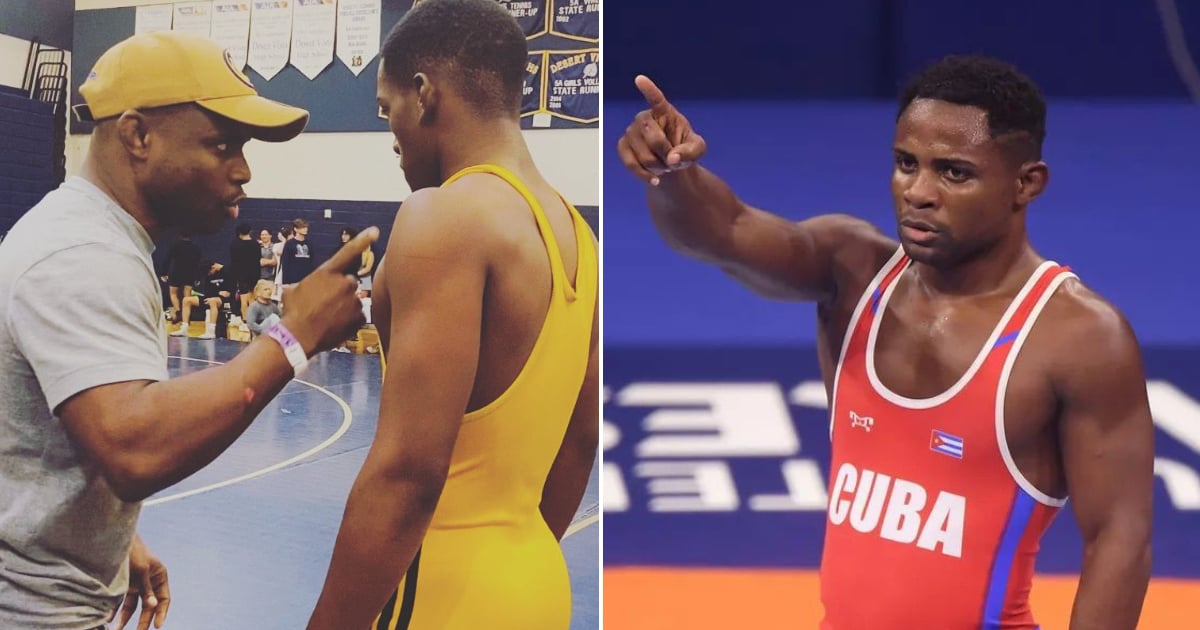One of the most prominent figures in Cuban wrestling is Yowlys Bonne from Guantánamo, a world champion and medalist in significant events. At 40, Yowlys resides in the United States, carving out a new path.
"I arrived in this country on October 10, 2022, with my family via the perilous journey many Cubans undertake, known as 'los volcanes.' I lived in Phoenix, Arizona for 20 months. Recently, I moved to Goodland, Kansas, where I work as a coach at Northwest Kansas Technical College. I'm fortunate to live with my closest loved ones. I have three children: my son, José Yowlys, 19, who practiced American folk style wrestling but now leans toward mixed martial arts. He had his first amateur fight in San Diego, California. I also have three-year-old twins, Yaimy and Yeimy. My wife, Delkis Hernández, was on the national judo team in the 57 kg division. We met at Cerro Pelado and have been together for 11 years, married for five."
Early Inclinations Towards Wrestling
Reflecting on his early years, Bonne shared, "I was born in Guantánamo on November 2, 1983. My first steps in sports were in athletics and boxing, which was my favorite. Wrestling came later. My first coach, known as Pacha, guided me at the base level. I then continued with Ónix Pérez and was soon scouted for the EIDE by Froilán Serrano. At 13, I joined the national ESPA under coach Arturo Yanes, and from there, I moved to Cerro Pelado with Filiberto Delgado. I achieved my greatest results with coach Julio Mendieta, who is now the head of the national freestyle wrestling team."
When asked if he always favored freestyle wrestling, Bonne said, "I always preferred freestyle, although I also trained in Greco-Roman. I competed in Greco at the 2002 Pan American Junior Championships, where I won the title and was named the most technical wrestler. However, my coach Froilán Serrano always steered me towards freestyle."
Bonne revealed his favorite techniques: "I mastered various techniques and throws, but my best moves were the suplex, the Oushi Gary (a Japanese judo technique involving a leg hook and backward sweep), and the 'bombero,' a move where I would lift my opponent entirely and throw them for maximum points. I also used the 'turca' combined with a lock in four-point positions to finish many matches."
In his youth, Bonne was known for his versatility. "Hahaha, well, I worked hard to be good," he chuckled.
Wrestling in the German Bundesliga
Bonne was one of the first Cuban wrestlers to participate in the German Bundesliga, a significant opportunity as athletes received financial compensation. "I wrestled for AVS Nendingen alongside the giant Mijaín López. I competed for four seasons, from late September to early February. In my first year, experienced wrestler Alejandro 'Calabaza' Valdés was part of another club. Over the years, more teammates joined."
When asked if the Bundesliga represented a 'respite' for Cuban wrestlers, Bonne said, "I think so. According to my contract, payments were personal, made in cash after each match, which took place every Saturday and some Sundays. I had to give 10% of my earnings to the Cuban Federation."
World Championships and Olympic Struggles
Bonne is a world champion and bronze medalist, but the Olympic podium eluded him. "I won the world title in Budapest, Hungary in 2018 in the 61 kg division and bronze at the Tashkent 2014 and Paris 2017 World Championships. In Budapest, I felt great and reached the final against Russia's Gadzhimurad Rashidov, defeating him 6-5. My 'bombero' technique, with a leg tackle, was crucial. I also defeated Iván Guidea from Romania, Esmaeil Mohammadbaghuer from Iran, and in the semi-finals, Joseph Daniel Colón from the United States."
However, the Olympics were a different story. "My weight category was eliminated, forcing me to cut a lot of weight. I was elite at 61 kg, but dropping to 57 kg was tough. In London 2012, I was eliminated by Japan's Kenichi Yumoto, finishing 14th. In Rio 2016, another Japanese wrestler, Rei Higuchi, who eventually won silver, defeated me, and I finished fifth. I also placed third and first at the Pan American Games in Guadalajara 2011 and Toronto 2015, respectively."
Bonne discussed the state of Cuban wrestling, noting that despite having great wrestlers like Raúl Cascaret, Joel Romero, and himself, freestyle wrestling has lagged behind Greco-Roman. "In my opinion, freestyle wrestling generally has a higher level, but Greco-Roman wrestlers have been more dedicated. The preparation and nutrition for Greco-Roman wrestlers have been superior."
He emphasized the decline in Cuban sports, attributing it to lack of support. "The reality is that with the lack of attention to both current athletes and former greats, Cuban sports will die; our great legacy will disappear. Individual talents will always exist, but that doesn't sustain the sports movement. The once-massive base is dwindling, and without it, the superstructure can't stand. The reduction of ESPA schools, especially the national ESPA, which fed all sports teams, is a clear example."
Impact of Political and Economic Challenges on Cuban Wrestling
In this section, we address key questions about the state of Cuban wrestling and the broader sports environment, based on insights from Yowlys Bonne’s interview.
Why has Cuban freestyle wrestling lagged behind Greco-Roman wrestling?
Bonne attributes this to better preparation and nutrition for Greco-Roman wrestlers. Freestyle has a higher level generally, but dedication and support have favored Greco-Roman.
What were the challenges Bonne faced in the Olympics?
Bonne struggled with significant weight cuts after his category was eliminated, affecting his performance. He faced tough competitors and couldn't maintain his elite status at a lower weight.
How did competing in the German Bundesliga benefit Cuban wrestlers?
The Bundesliga provided financial compensation, which was a significant 'respite.' Wrestlers received personal payments per match, offering a rare financial benefit compared to their situation in Cuba.
